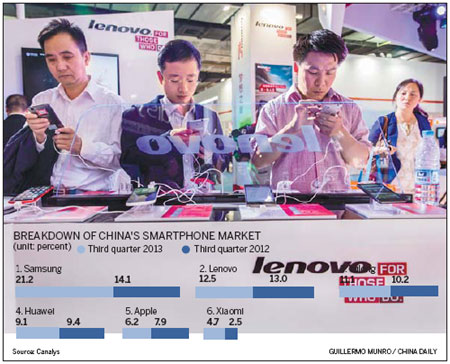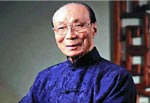Lenovo challenges Apple, Samsung
Updated: 2014-01-13 08:16
(China Daily USA)
|
||||||||
Yang Yuanqing was never afraid of declaring war on the strongest enemies.
After beating Hewlett-Packard Co to take the No 1 position in the global personal computer industry, Yang, the chairman and CEO of Lenovo Group Ltd, can't wait to challenge Apple Inc and Samsung Electronics Co Ltd.
"Traditional PC vendors are no longer our top rivals nowadays," said the engineer-turned-executive. "Our next step is to challenge Apple and Samsung in the portable consumer electronics sector."
Over the past five years, Lenovo eroded other PC manufacturers' market share bit by bit, reaching the top position in China first and then in the rest of the world. Yang is determined to copy this strategy on a new battleground.
The biggest campaigns Lenovo launched in 2013 were for its smartphone and tablet series.
The Beijing-based company invited basketball sensation Kobe Bryant and Hollywood star Ashton Kutcher to endorse its high-end smartphone and tablet products in a bid to lure young Chinese buyers.
The company came out with most of its flagship gadgets just before Apple unveiled its iPhone 5S and iPad Air devices.
Lenovo has sold 1 million Yoga-branded tablets since the product's launch in October, according to Yang, who also plans to bring Lenovo's consumer electronics to developed markets such as the United Kingdom and the United States.
The company sees the smartphone market as a stepping stone to enter other mobile consumer electronics markets because of its popularity in both emerging and developed markets.
According to a Gartner report, Lenovo was the world's third-largest smartphone manufacturer in terms of market share as of the third quarter of 2013.
The company sold nearly 13 million smartphones around the world, taking more than 5 percent of global market share.
Yet the Chinese company still lags far behind Apple and Samsung in terms of shipments.
Asia-Pacific markets are poised to post huge increases in smartphone sales as more buyers abandon feature phones for lower-end smartphones.
"Consumers in China and Latin America are rushing to replace their old models with smartphones," said Anshul Gupta, principal research analyst at Gartner.
About 48 percent of Chinese mobile phone owners will use a smartphone by the end of 2014, Forrester Research Inc estimated. The figure is expected to increase to 64 percent by 2017.
In China, Lenovo is the second-largest vendor after Samsung, according to local research firm Analysys International.
Among the 93 million smartphones sold in the third quarter, Lenovo controlled 11.4 percent of market share, while Samsung had 18.1 percent.
Liu Jun, vice-president of Lenovo, said the company is eyeing an even bigger market share outside China.
Lenovo sees the rise of emerging markets as a golden opportunity for its business in the post-PC era. It's quickly expanding operations in Southeast Asian nations including Malaysia, Indonesia and Singapore.
Antonio Wang, associate director at industry consultancy IDC China, said that Lenovo's advances were mostly made via overseas M&A deals at the beginning of 2013.
"The company was able to use its own research and successful marketing strategy in the mobile devices sector to create huge profits later on," Wang said.
Yang, Lenovo's CEO, recently announced the opening of a brand-new assembly plant in Wuhan, Hubei province.
Located in the southeast part of the city, the factory is the world's largest manufacturing facility for Lenovo and a hub for the company's mobile product line, Yang said.
It will build more than 30 million smartphones and tablets in 2014, representing 40 percent of the company's total output in the mobile sector.
The plant will also recruit another 4,000 employees this year and will ship out more than 100 million mobile devices once put into full operation.
"We will largely rely on our own plants to feed global demand for mobile devices," said Liu, Lenovo's vice-president.
Unlike Apple, which outsources its production, Lenovo makes nearly 70 percent of its mobile devices itself.
"The company plans to turn the Wuhan plant into the world's largest facility for developing, testing and manufacturing mobile devices," Liu said.

(China Daily USA 01/13/2014 page15)
Most Viewed
Editor's Picks

|

|

|

|

|

|
Today's Top News
China is now No 1 in trade
PANDA! opens in Las Vegas
Rich Chinese tourists looking to space
Deals 'blow' against separatists
Sharp fall in tourism hits Beijing
Sharon's legacy full of contradictions
Lenovo targets US, but when?
Embraer extends coverage in China's aircraft market
US Weekly

|

|














